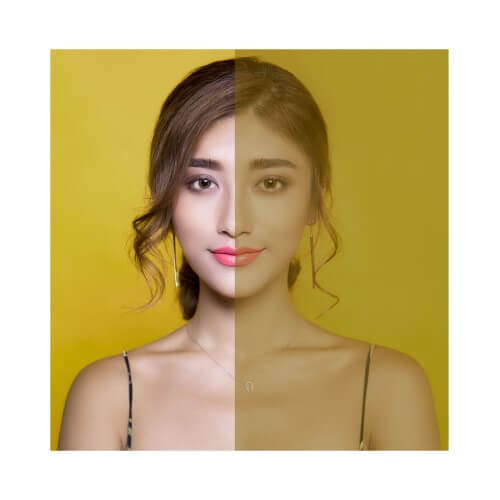I am shifting focus to skin “lightening”, “brightening” or “whitening” depending on your sense of political sensibility.
What was your first experience of knowing you had a skin tone that made you different?
It turns out that mine was as young as 3 years old – on my first visit to India from Africa. I grew up pre-budget airline travel, when your extended family and the obligatory entourage of the neighbour’s kids, a marching band and bright orange marigold garlands, would greet you at the airport.
As we walked past the endless stream of our baggage on the tarmac of New Delhi airport, I, with my viciously curly hair, Barbie pink frock and dark skin, was greeted by an uncle, “Jha. She really looks like African.”
He was referring to my skin tone. There is no doubt.
I am conflicted – what he said was simultaneously hilarious and deeply offence. I find it difficult to be offended as its a comment that I have received so regularly from my Indian brethren, that it is etched into my psyche as “normal” behavior.
Today, I want to give you some food for thought – between earning a living, managing our family etc – we simply do not pay attention to such issues and I’d like your attention for the 2 minutes it takes to read this article.
However, I am absolutely not here to judge or be judged. If you want to look as dark or as fair as possible, that is your business. I am here to help you achieve your goals BUT in the safest way possible.
Starting with some statistics
Over 60 per cent of skincare sold in India relates to skin lightening products and it remains one of the fastest growing categories at about 6%. Men are just as likely as women to use a skin lightening cream.
And if you think this is an Indian only phenomenon, you couldn’t be more wrong. Anywhere between 15% – 70% of women from afar as Japan, Singapore, South Korea, Thailand and China to Africa and the USA, use skin lightening products. That’s easily about 1 billion+ people who want to address concerns such as hyperpigmentation, age spots and so on.
However, the vast majority of these billion, especially in the South Asian sub-continent want to be a lighter skin tone.
This really shocked me. In a country, where 90%+ of individuals do not share Gywenth Paltrow’s skin tone, a sizeable chunky of our population has aspirations to acquire her complexion.
Why is this the case?
As a dark skinned person, I already know the answer because it is my reality – however, don’t take my word for it, multiple studies demonstrate that fairer skin is associated with higher socio-economic status and income. The matrimonial section of our Sunday newspapers and matrimonial websites are full of references to “fair”, “extremely fair” as a pre-requisite for men but also women describing themselves.
In some ways, NRIs have taken this further, as a study in the UK shows that dark skinned females are unlikely to find a suitable match online when compared to lighter skinned women. Also, fairer skin is likely to result in better employment prospects and income.
My take
In America, you frequently encounter the term “white privilege.” It doesn’t mean that if you are Caucasian life will be without poverty, unemployment etc. What it means to me, is that the colour of your skin will NOT be a factor in where you will live, whether or not you live in a household with both parents, whether or not you get an educated and so on.
If you are African-American, your skin colour is a disadvantage and your less likely to do as well in life as your Caucasian counter-part.
My view is this:
– “Colorism” or “skin-tone” stigma is the Indian equivalent of white privilege and it disproportionately affects women and especially, poor women
– How we interact with each other because of our skin tone – for whatever reason (caste, North/South divide etc) -reinforces deeply prejudicial behavior.
– Our love affair of fair Bollywood and TV actors/actresses especially in the North of India is a resounding indictment that “aspirational fairness” is a legitimate pursuit akin to losing weight or doing well in your exams or having a successful career. Images portrayed by the media “normalize” our deep-rooted desire to be fair. The name Fairy & Lovely says it all. You can imagine that’s a comment that passes at a wedding. Beta you are looking so Fair today and so lovely.
Finally, I leave you with this.
The potential long-term consequences of this phenomenon
Numerous Hollywood and Bollywood actresses, many of them extremely successful used to have darker skin, but now have lighter skin.
I won’t mention any names, because quite frankly I don’t want to be trolled to death. But one of them is an African-American women, who against all odds is even more successful than the singer Madonna.
If she can overcome race, gender, lower socio-economic status to become a role model for women everywhere, then why is she aspiring to fairer skin?
Can aspirational fairness be so deeply rooted in our psyche that EVEN when we overcome poverty, racism, gender discrimination, we still have not overcome our desire to be fair?
As Cyclops (aka ex-boyfriend) frequently used to say about the state of our doomed relationship, “Are we in bigger trouble then we thought?”
Drop me a line at email@happyskindays.com and I would love to hear your thoughts too….
